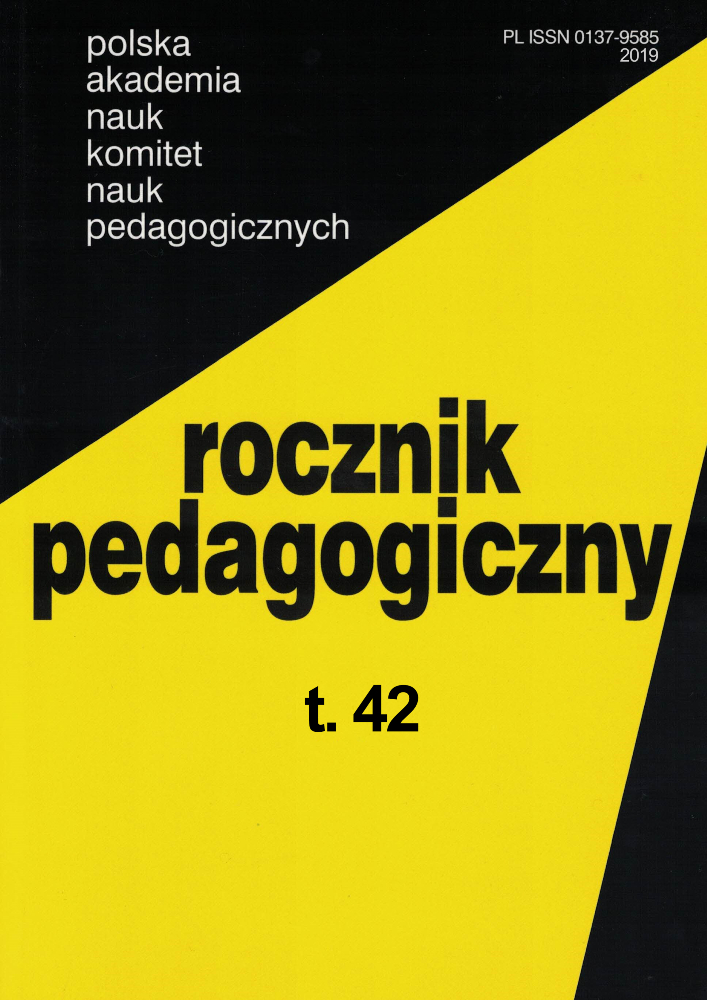Abstract
The article attempts to familiarise the reader with the memoirs of teachers compiled as a result of the third edition of the National Competition for memoirs and other autobiographical statements under the title “Teacher’s message: Generations of Polish Teachers for the Future” (2014–2016). In the light of the preliminary analysis of the texts submitted, an outline emerges of the mission that teachers would see for themselves, for their successors, and for education of the 21st century. It is something significant: the mission of protecting humanity for future generations, for preserving the world, for the survival of spiritual values confronted with consumerism, cybertechnology, and scientific progress on the basis of genetics, computer science, etc. Education appears in the light of these diaries as a space and a way to reinforce humanity, which is threatened from different sides. There are two approaches here, two concepts of education and training, and of the teacher’s role in this work, the more conservative and the more liberal. In general, it is a question of rational citizenship, the rational use of subjectivity and autonomy, which is similar to M. Nussbaum’s con- cept of remedying the citizenship crisis. This mission of education requires reflective, subjective and autonomous teachers, using discursive reflexivity (thinking about their own thinking), with an analytical attitude, respecting the requirement of interdependence, understanding the contemporary world, themselves and others. In turn, what this requires from teachers is deep knowledge, thorough education, a high level of culture, and humanistic, subjective and reflective changes in their educa- tion and professional development.
Funding
teachers, the older generation, diaries, autobiographies, message, upbringing, humanity
References
Bauman Z., Zindywidualizowane społeczeństwo, GWP, Gdańsk 2008.
Bloom A., Umysł zamknięty, Zysk i S-ka, Poznań 2012.
Dróżka W., Generacja wielkiej zmiany. Studium autobiografii średniego pokolenia nauczycieli pol-
skich 2004, Wydawnictwo Naukowe UJK, Kielce 2008.
Dróżka W., „Jak pokonać siłą własną”. Relacje nauczyciele – uczniowie w świetle pamiętników
nauczycieli, [w:] H. Kwiatkowska (red.), Uczłowieczyć edukację, Impuls, Kraków 2015. Dróżka W., Młode pokolenie nauczycieli. Studium autobiografii młodych nauczycieli polskich lat
dziewięćdziesiątych, Wydawnictwo Naukowe UJK, Kielce 1997 [II wyd. 2004].
Dróżka W., Nauczycielskie przesłanie – w trosce o przyszłość. Pamiętniki starszego pokolenia na-
uczycieli 2016, Wydawnictwo Naukowe, Kielce 2018.
Dróżka W., Wartości i dążenia zawodowe nauczycieli w zmiennym kontekście 25-lecia, [w:] J. Mada-
lińska-Michalak (red.), O nową jakość edukacji nauczycieli, Wydawnictwo UW, Warszawa 2017. Dróżka W., Wartości oraz cele życiowe i zawodowe nauczycieli. Pokolenia z lat 1989/1990;
2014/2015, Wydawnictwo Naukowe UJK, Kielce 2017.
Dróżka W., Współczesne konteksty dehumanizacji szkoły, na kanwie pamiętników średniego pokole-
nia nauczycieli 2004, [w:] E. Kobyłecka (red.), O humanizacji pracy zawodowej nauczyciela,
PTP, Zielona Góra 2007.
Erikson E.H., Dzieciństwo i społeczeństwo, Dom Wydawniczy Rebis, Poznań 1997.
Furedi F., Gdzie się podziali wszyscy intelektualiści, Wydawnictwo Naukowe PWN, Warszawa
2008.
Giddens A., Europa w epoce globalnej, Wydawnictwo Naukowe PWN, Warszawa 2009. Kłoskowska A., Kultury narodowe u korzeni, Wydawnictwo Naukowe PWN, Warszawa 2005. Nussbaum M.C., W trosce o człowieczeństwo. Klasyczna obrona reformy kształcenia ogólnego,
przeł. A. Męczkowska, wstęp J. Szacki, Wydawnictwo Naukowe DSW, Wrocław 2008. Potulicka E., Rutkowiak J. (red.), Neoliberalne uwikłania edukacji, Impuls, Kraków 2010.
License
Copyright (c) 1970 Wanda Dróżka

This work is licensed under a Creative Commons Attribution-NonCommercial-NoDerivatives 4.0 International License.
